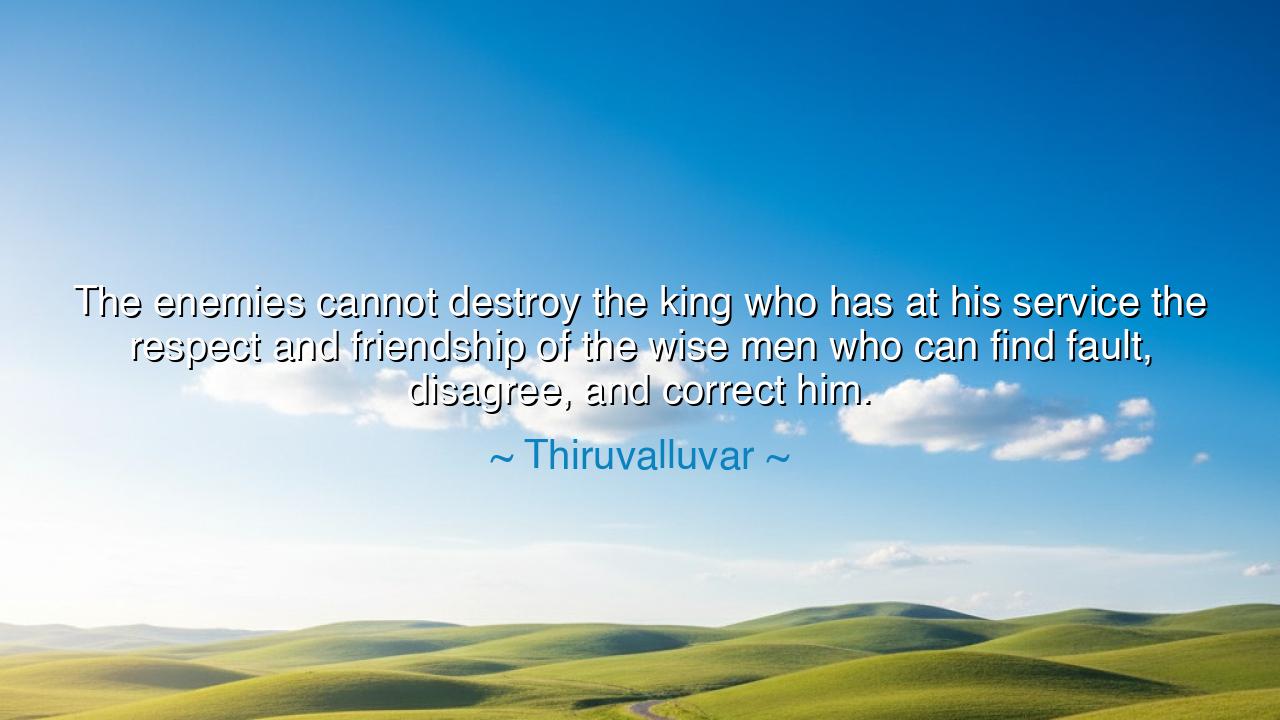
The enemies cannot destroy the king who has at his service the
The enemies cannot destroy the king who has at his service the respect and friendship of the wise men who can find fault, disagree, and correct him.






“The enemies cannot destroy the king who has at his service the respect and friendship of the wise men who can find fault, disagree, and correct him.” Thus spoke Thiruvalluvar, the sage of the Tamil land, whose words in the Tirukkural have echoed across centuries as the distilled essence of wisdom. In this single verse, he reveals a truth as timeless as the stars — that true strength does not lie in armies, fortresses, or riches, but in the counsel of the wise. A ruler, or any leader of men, who surrounds himself with those unafraid to speak truth, who treasures correction more than flattery, stands invincible — for his wisdom becomes a shield stronger than steel.
In every age, kings have risen to glory and fallen to ruin. Those who perished were often not slain by the sword of their enemies, but by the silence of their own courtiers. Thiruvalluvar, in his profound simplicity, warns that a king’s friends must also be his critics, and his wise men must dare to disagree. For what use is a court filled with nodding heads and silver tongues, if they leave the ruler blind to his own errors? The king who welcomes correction, who values truth above praise, becomes the master of his fate; but the king who despises wisdom and silences dissent is already conquered — not by others, but by his own pride.
History offers many mirrors for this wisdom. Recall the tale of King David of ancient Israel. When he sinned in secret, none dared confront him — save the prophet Nathan, who came before the throne with courage and spoke words that pierced the king’s heart like an arrow: “Thou art the man.” David, though mighty, did not strike Nathan down; instead, he bowed before truth and repented. His humility preserved his soul and his kingdom. Had he surrounded himself only with flatterers, his legacy would have ended in shame. Thus, Thiruvalluvar’s teaching breathes even in the scriptures of faraway lands — that the wise counselor who rebukes with honesty is more precious than the warrior who wins ten battles.
Consider, too, the fate of kings who ignored this sacred law. Emperor Nero, drunk with vanity, surrounded himself with sycophants who praised his every madness. None dared to correct him as he sank deeper into cruelty and excess. Rome burned beneath his gaze, and with it burned the respect of his people. He perished not because his enemies were strong, but because his friends were weak — weak in virtue, weak in truth, weak in courage. His throne crumbled upon the sands of deceit, proving once more that a ruler without honest counsel stands alone in the midst of his own ruin.
But the wisdom of Thiruvalluvar extends beyond kings and thrones. It speaks to every soul who holds power — the teacher, the parent, the leader, the friend. All who wield influence must seek those who will tell them what they need to hear, not merely what they wish to hear. The friendship of the wise is not always comfortable, for truth burns before it cleanses. Yet it is through this burning that we are refined. The fool avoids correction and remains weak; the wise embrace it and become unassailable.
It is said that Chanakya, the great minister of India’s Mauryan Empire, once told his king Chandragupta, “The man who shows you your faults is your true friend; the one who praises you to please you is your enemy.” And so, by heeding Chanakya’s guidance, Chandragupta forged one of the mightiest empires in history. His power rested not on cruelty or conquest, but on counsel and clarity. In the spirit of Thiruvalluvar’s verse, he ruled not alone, but with the friendship of those unafraid to disagree — and therefore remained unconquered.
So, my child, learn this sacred lesson: surround yourself not with those who flatter, but with those who speak truth even when it stings. Honor those who correct you, for they are the architects of your greatness. Whether you are king or commoner, the principle is the same — a wise friend is your fortress, and honest counsel your crown. Seek not the comfort of agreement, but the strength of truth.
For in the end, as Thiruvalluvar teaches, the one who is guided by wisdom and humility cannot be destroyed. His enemies may strike, but they will find no weakness in him, for he stands guarded not by walls, but by the friendship of the wise and courageous — those who dare to disagree, and in doing so, save him from himself. And that, my child, is the mark of true kingship — not dominion over others, but mastery over one’s own pride, guided by the sacred light of honest friendship.






AAdministratorAdministrator
Welcome, honored guests. Please leave a comment, we will respond soon